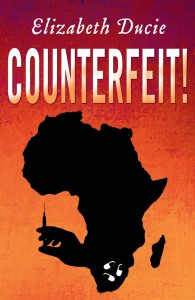Counterfeit! Update: Meet Kabwe
Kabwe Mazoka is the first person we meet in Counterfeit! He is Zambian, in his early thirties and following the death of his father, runs the family company, Mazokapharm, in Ndola, in the north of the country. The business, which makes cough syrups for children, is failing and Kabwe has resorted to desperate measures to keep his workers in their jobs and look after his ailing mother. This is how we first meet him in December 2002.
Kabwe Mazoka walks up the hill, scuffing his feet in the rutted and baked red earth. It’s been dry for months, but today thick clouds mask the sun and when the rains come, this will be a water course, pouring mud and stinking filth into the main street below. He turns through a broken-down gate and walks across the yard. A mangy dog, tied with rope to a ring on the fence, jumps to its feet yelping, before sinking back on its haunches, eyeing him warily.
The building was painted white once. Pale flakes cluster around rusty lines where the reinforcing bars are breaking through the pitted concrete. In the single row of windows running below the flat roof, most of the panes of glass are missing.
A line of women sit in the dirt against the wall, taking advantage of the shade from the over-hanging roof. As Kabwe unlocks the shiny new padlock on the door, they rise and slowly follow him into the building. The first raindrops splash into the dust.
The downpour hits the corrugated iron roof like stones from an angry crowd. Kabwe uses a metal pole to stir the thick, creamy liquid in the cleaned-out oil drum. They’d given him the pole to replace the old wooden stick he’d used before. ‘Splinters in the mixture means an extra filtration stage,’ they said. ‘That would add time and money to the process,’ they said. ‘We can’t afford either,’ they said—and neither could he.
The men were coming back today, bringing brightly coloured labels and delivery instructions. They would be cross if the bottles weren’t filled ready for labelling and packing. He didn’t want them to be cross again.
They’d been cross when he suggested testing the ingredients before making the medicine. They showed him pieces of paper with green stickers and words in another language. They told him to ‘just get on with it.’ So he did.
When Kabwe ran out of the glycerol used to sweeten the cough medicines, they brought him drums in a battered lorry and told him to ‘get them unloaded and stored in the lock-up.’ The drums were different from the ones he’d had previously. These were red. Last time they were blue. The name was different too, longer. They told him it was just the chemical name for the same material. He pointed to the place where warning symbols and storage conditions were usually printed. The labels had been scratched and scraped; none of the words were legible. The men laughed at him and told him to ‘just get on with it.’ So he did.
 Today, the men arrive just as the last of the misshapen brown bottles is being filled. They’d been pleased with Kabwe when he managed to source these rejects cheaply from the local glass plant. For eleven months each year, the plant makes beer bottles, then the mechanics switch the moulds and they make medicine bottles, a year’s supply in just four weeks. They need a lot more beer bottles than medicine bottles in Africa.
Today, the men arrive just as the last of the misshapen brown bottles is being filled. They’d been pleased with Kabwe when he managed to source these rejects cheaply from the local glass plant. For eleven months each year, the plant makes beer bottles, then the mechanics switch the moulds and they make medicine bottles, a year’s supply in just four weeks. They need a lot more beer bottles than medicine bottles in Africa.
The new labels are pink and blue with white writing. The company name—this time an American one with an address in Milwaukee—is printed in small letters at the bottom. The picture of a mother and child looks comforting, although Kabwe wonders why they always use white people as models.
Just before the men drive away, they hand Kabwe an envelope, stuffed with stained and greasy bank-notes. Now he’ll be able to pay the filling team. Now he’ll be able to buy supplies on the way home. Now his mother will be able to keep her appointment at the clinic.
The vans drive off into the night, heading for unprotected borders, to meet other vehicles driven by other desperate men trying to earn enough to feed their families. Kabwe sits slumped in his office, too tired to move, and tries to still the doubts flying around his head.
The men had told him the American company wouldn’t mind. ‘They sell medicines all over the world,’ they said. ‘They won’t miss a few sales in Africa,’ they said. ‘You’re helping people get hold of medicines they couldn’t normally afford,’ they said. ‘It’s a public service really,’ they said.
Kabwe glances at the dispatch instructions for the latest batches of cough syrup. There are six names on the list: three government purchase houses; two regional hospitals; and a large distributor. They are spread across Angola, Malawi, Zimbabwe and Tanzania. He is relieved, as always, to see his own country missing from the list. Not his people, not this time. But one day, he knows, it will be their turn.
Counterfeit! will be published by Chudleigh Phoenix Publications in July 2016.
Comments (0)